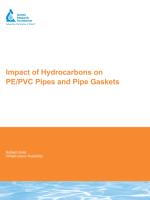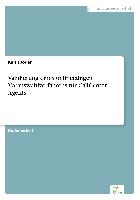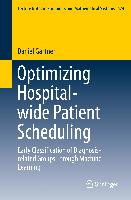Impact of Hydrocarbons on Pe/PVC Pipes and Pipe Gaskets
BücherAngebote / Angebote:
Some of the factors for the increased use of plastic pipes in water distri¬bution systems are their ease of installation and handling, dura¬bility, and good resistance to the chemicals used in water treatment, such as chlorine. In many urban areas, plastic pipes may come into contact with contaminated soils as a result of leaks from underground storage tanks, chemical spills, and improper disposal of used chemicals. These pollutants from leaking storage tanks and contaminated soils can and have posed serious threats to the longevity and structural integrity of plastic pipes and elastomeric gaskets which, in turn, can affect the water quality in the distribution system. Although there are research studies and case studies documenting the permeation of organic compounds through plastic pipes and elastomeric gaskets, there is still a lack of understanding of the performance of PE and PVC pipe mate¬rials and elastomeric gaskets in hydrocarbon-contaminated soils commonly encountered un¬der field conditions.
The objective of this project was to study the impact of hydrocarbons on polyethylene (PE) and polyvinyl chloride (PVC) pipes and elastomeric gaskets. Specific tasks were to (1) survey water utilities to learn about their experiences with plastic pipes and permeation of mains and services, (2) study permeation through PE and PVC pipes exposed to hydrocarbon contamination, (3) develop laboratory tests to predict permeation of pipes and gaskets, and (4) study permeation through pipe gaskets exposed to hydrocarbons.
The research team surveyed utilities by mail and telephone to obtain information about their use of plastic pipes and experiences with permeation incidents and successful uses in known hydrocarbon-contaminated areas. Case histories with relevant laboratory data were developed. Permeation of PE and PVC pipes exposed to soil and water contamination was studied in pipe-bottle apparatuses. Novel pipe-drum apparatuses were used to study permeation of gasketed pipe-joints. New laboratory tests were developed to measure and predict permeation through PVC pipe. The moving front test was used in studies that revised and extended the understanding of the theory of permeation in PVC pipes, the thresholds of environmental contamination that might impact engineering decisions, and the impact of combinations of BTEX compounds on PVC pipe.
Folgt in ca. 15 Arbeitstagen




